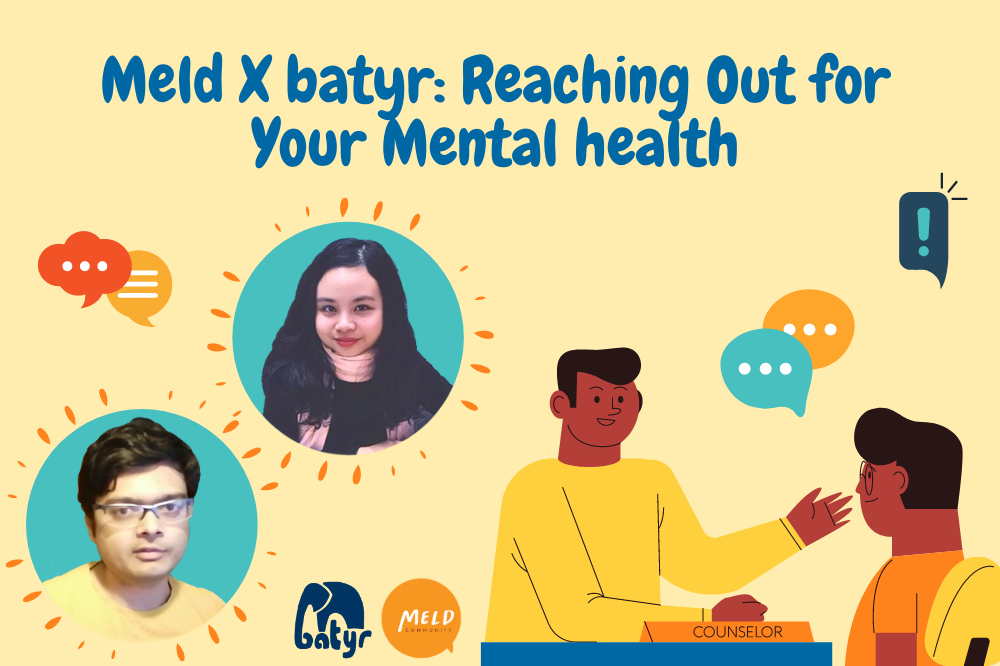Reaching Out for Your Mental Health
Reaching out to get help might be one of the hardest things that we can do for our mental health, but it’s also the greatest start for our wellbeing.
Taking care of our mental wellbeing is important for everyone, doubly so for international students who just arrived in Australia. Many of us came alone with a different language and culture while carrying parental expectations we’re hard pressed to excel at.
Research by Orygen shows that international students have a higher risk in their mental wellbeing due to social & cultural isolation, high expectations from performance pressures, financial stress, language barriers and new academic system.
It can get overwhelming. This is the time when we start to learn about our mental health, looking for help and comfort, in your friends/family or a professional.
But reaching out sounds easier said than done. Obstacles obstruct us and deepens our fear of wanting aid. The Coroners Prevention Unit (CPU) warned that International students are less likely to seek help for their mental health.
Phuong Nguyen, who attended batyr’s being herd workshop (where you learn to share your own story) is a mental health advocate for International students, said that one of the main things that discouraged her from seeking help was feeling as though she didn’t need it.
“Even today, sometimes I still have that stigma that my problem is not as serious for me to seek for help, I don’t have depression or I’m not anxious,” she said.
Moreover, Phuong didn’t want to take away slots from people who needed it more.
“I’m not deserving of seeking help, because my problem isn’t as serious as many other people,” she told herself.
A report by International Education Association of Australia (IEAA) noted that there is a tendency for international students to self-treat or be self-reliant, to just power through stress and anxiety on their own terms.
Unfortunately, this leads to burnout, which manifests to increasing burden when doing simple tasks.
Aditya, who’s a batyr speaker for International students, explained his journey with burnout. At one point, He stayed indoors all day, only eating junk food and had trouble keeping up with his classes.
“I just could not push myself anymore and I succumbed to depression almost completely,” he said.
But Aditya was reluctant to share this with his family and friends. He attributed this to his friends and family’s high expectations and his parent’s financial contribution. Eventually, he also stopped responding to his few friends and parents who tried to reach out to him.
Ultimately he realized that he didn’t want things to worsen in his self-isolation, so he mustered up the courage to reconnect with his parents.
He went back home to India during summer break and approached his parents at dinner about his mental health. He remembered they were very understanding of his struggles.
“I became closer with my family, We also discussed how my father and sister went through something similar in their own time,” he recalled.
Phuong went through a similar healing period. When she started to feel overwhelmed by her schedule, she set aside some time to reach out to her university’s free counselling service. She also reached out to a friend to get advice.
Though she didn’t have a memorable counselling experience (she thinks it’s due to the counsellor’s lack of cultural awareness), she was still grateful to have pushed herself for help and for the advice she got from her friend instead.
She encourages everyone to talk to a professional. “Sometimes you need more professional advice rather than people you know, because they [friend/family] mostly say what you want to hear.”
Overcoming the stigma, taboo-ness of mental health and talking to a friend or a counsellor is a sign of strength. Many of us only learn about it after coming to Australia.
Phuong commends international students who seek help, because they were willing to take a risk to do so.
“It can be scary because you don’t know what to expect [at the start]. They still had that fear their family might know, a lot of international students don’t want their family to know about what they disclose to their counsellor so I think they’re brave,” she cheered.
When asked about advice on how to stay mindful about your mental health, Aditya and Phuong said it’s important to keep physically active, and join a school club to socialize.
Phuong is filled with anticipation to go hiking when the lockdown is over, and she often likes to write about her mental health experience. Meanwhile Aditya cooks healthy and delicious meals along with setting small goals for himself – such as sleeping on time, and going to the gym.
batyr is launching a new mental health program to support international students like Phuong and Aditya. Register for the onlinelaunch event on Thursday 29th October at 4pm – 5pm AEDT.
If you are feeling down know someone who is, you can seek help through hotlines such as:
Lifeline at 13 11 14,
BeyondBlue at 1300 22 4636,
Headspace at 1800 650 980.
QLife at 1800 184 527, If you identify as a member of the LGBTQIA+ community,
Students may also seek help from in-house university counsellors or helplines.
